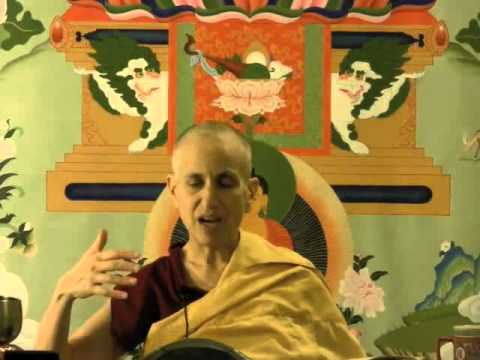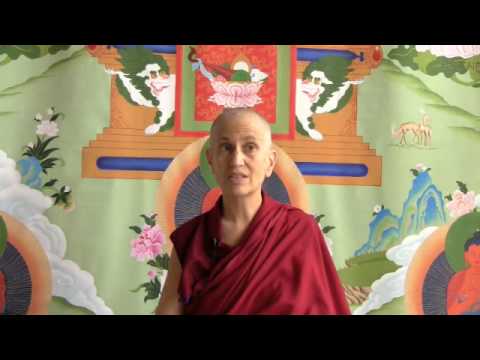Receiving praise: The bodhisattva vows
Part of a series of Bodhisattva's Breakfast Corner talks given during the Green Tara Winter Retreat from December 2009 to March 2010.
- How to receive praise in line with the bodhisattva vows
- An example of joyous effort—benefiting others with no need for thanks or praise
Green Tara Retreat 064: Receiving praise and the bodhisattva vow (download)
Part 1
Part 2
Yesterday, I got a note from Venerable Semkye. She was concerned about something that she had written to Venerable Jendy. Venerable Jendy has been working on the translations for the ordination that is going to happen in Taiwan. They had a larger ordination team at one point and some people dropped out. So Venerable Jendy has, I think, shouldered the whole responsibility. Venerable Hong Chen is helping her to translate all this material and there is a deadline. She is doing it without getting paid anything, and she is working so hard that she said she didn’t have time to buy food, and cook food or anything.
They asked some of the people at the temple (to help), and so every lunchtime the temple people are bringing lunch boxes for them to eat. She says it is very nice, and she feels like she is going back to the time of the Buddha and really receiving the food. She is working very hard doing this. So I had let Venerable Semkye know, and Venerable Semkye wrote a very nice letter of appreciation to Venerable Jendy. Venerable Jendy responded and said, “Oh, I feel embarrassed, praise is not what it is all about. I am only doing what any Chinese monastic should do in the situation.” So Venerable Semkye was worried about having done something wrong because Venerable Jendy felt embarrassed.
So, I wrote to Venerable Semkye and said, “No, that’s not the point.” That Venerable Jendy is setting an example for how you serve sentient beings and how you receive praise. Because she is just doing what she is doing out of the kindness of her heart. She doesn’t see it as anything extraordinary; that is why she doesn’t want the praise. As she says, “I’m just doing what any monastic would do.” In other words, when you have the bodhisattva vow and people ask you to help, if you can help, you do it. You are not expecting people to fall all over you in appreciation, and to get either offerings from it, or reputation, or praise, or anything like that. We are just seeing how Venerable Jendy practices in a very pure way.
This is an example to take, first of all, of having joyous effort in extending ourselves to benefit sentient beings even when it is tiring, exhausting, and difficult. She is doing little by little, she doesn’t feel like she has to finish the entire translation; each day she is doing what she can, and then picking up the next day—and just going on until it gets finished. If people praise her, it’s no big deal because that’s not why she’s doing what she is doing.
The whole thing is very much an example for us, on how we should practice in benefiting others, and how we should practice when people do praise us. I think this is a very good example; there’s a lot that we can learn if our eyes are open for we can learn from observing how other people do things. Also this is a very good example in another way: that everything somebody says we shouldn’t always self-reference. Like here you were concerned that you have done something wrong, and that wasn’t the issue at all.
Audience: I think part of it is that is very helpful because the intention behind the note was what was really coming from my heart, how it gets received I have to, in a deeper way, let go of, but yet understand what she was trying to tell me.
Venerable Thubten Chodron (VTC): Right. Well then, because if you are saying what you say from your heart—and then she says, “Oh, praise is embarrassing.” Do you feel like, “Oh, she rejected me?” or, “She doesn’t appreciate what I said to her?” Because then again, that is getting into the self-reference of, “Why did I say this? Was I expecting her to say, ‘Oh, you’re so wonderful because you notice how hard I am working.’” It’s also a thing of when we say things, just to be able to put it out there, and leave it without worrying about how people react. Her reaction was her way of accepting it by deflecting it. She didn’t gloat in her praise and say, “Oh, I’ve been working so hard, I am sure glad somebody around here finally noticed it. What do they expect of me, after all, I’m just doing so much. Oh, she wrote me a note, well that’s good, finally!” That’s not what Venerable Jendy is thinking. “Oh, I’m so wonderful, I got praised by Venerable Semkye, I must be really the most best…” That also is not in her mind. So likewise, when we receive compliments…
Audience: It was very beneficial for her, I think, I would thank her to acknowledge…
VTC: Yes, from Venerable Semkye’s side it was very good that she did that. I mean, that’s the thing when we praise people—is we need to see people’s good qualities and express that, not to win brownie points with them, but to touch face with our own good heart.
Audience: Maybe it seems that even though she responded in that way, she might have very, very much appreciated the (praise).
VTC: I am sure she did.
Audience: So, what she feels isn’t necessary the same as what she says and that appropriate response obviously wouldn’t be, “Thank you, I am glad you finally recognized what I am doing.” Even though it might be very encouraging for her to get that recognition, (and) make her feel very good about what she is doing and she is helping.
VTC: Yes, I am sure she appreciated that. Because also she appreciates if somebody else generates a positive mind.
Audience: So, she wasn’t deflecting it in terms like not… How to say this… So she wasn’t deflecting it in a self-effacing way of like “Oh, I don’t deserve this.”
VTC: Oh, no, she wasn’t saying “Oh, I’m worthless and therefore I’m unworthy of accepting your kindness.” She wasn’t saying that because she is not feeling that also. She is just saying, “I’m doing my duty.” When you do your duty, even if you are working hard, what is there to expect praise for? When you take the bodhisattva vow and then you help somebody, you are just doing what you have already promised you are going to do. You are not looking for somebody to say, “You are so wonderful.” You’re looking at your own internal practice of: “I have made a promise, am I acting according to my promise?”
In the 70s and early 80s, when things would come up where the lamas needed something for a course, we just had to work hard to get it done. I remember, because we were living in a building with no electricity, and they needed phonetics for a puja the next day. We were sitting out until, I don’t know what time, by candlelight, writing up these phonetics; then somebody would type them up, and there was this old, rickety, memo machine. This was in the 70s or 80s and this machine, I think, was from the 50s. Somebody had to type it up on the stencils that (were used), and then turn the machine on and it went around and around. Typing these things is awful because if you make a mistake it’s so difficult to correct. We would be up until who-knows-what-hour doing this kind of thing, but there was so much joy in our hearts doing it because we felt like we were serving our teachers, we were serving the Dharma, we were serving sentient beings. It was exciting to stay up late and do something like this. It didn’t matter what the conditions were, and you finished at whatever hour, then you got up at 4:30 or 5:00 in the morning and kept on.
Audience: Would you say that Venerable Jendy’s response was specifically good for counteracting pride? Maybe a different perspective for those of us in the West who might have low self-esteem, and then rather than deflecting and going to a place of self-effacing, is just to say, “You’re welcome.”
VTC: Yes, that’s fine. They are saying, “Oh, you’re welcome!” and there is just an acknowledging of somebody’s kindness and saying, “Thank you very much,” in return to them.
Venerable Thubten Chodron
Venerable Chodron emphasizes the practical application of Buddha’s teachings in our daily lives and is especially skilled at explaining them in ways easily understood and practiced by Westerners. She is well known for her warm, humorous, and lucid teachings. She was ordained as a Buddhist nun in 1977 by Kyabje Ling Rinpoche in Dharamsala, India, and in 1986 she received bhikshuni (full) ordination in Taiwan. Read her full bio.


